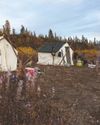Try GOLD - Free
A NEW ERA FOR OLD CROW
Briarpatch
|January/February 2020
In the Yukon’s northernmost community, the Vuntut Gwitchin First Nation is reckoning with how to preserve their land and culture, amid a warming climate and an influx of tourists

The July air is cool. Whitefish and sausages smoke on a grate above the fire. Hot coffee sits in a kettle by my side.
The kids are playing by the water. I sit around the fire with the adults, listening to them talk. About the day, about a game of capture the flag we played earlier that afternoon, about life here in Old Crow.
At 128 km north of the Arctic Circle, situated on the banks of the Porcupine River that connects Canada and the United States, Old Crow is one of around a dozen Gwich’in communities and home to around 250 members of the Vuntut Gwitchin First Nation. It is also the only fly-in community in the Yukon.
It is my second day in the community. I’m one of six journalism students who have travelled to the Yukon because our professor believes that, in order to be a good journalist, one must spend time with the people whose stories you seek to share.
The Gwich’in are part of a larger family of Indigenous peoples known as Athapaskans and one of the most northerly Indigenous communities on the North American continent, second only to the Inuit. The Gwich’in way of life remains – both culturally and economically – anchored to the land through hunting, fishing, and trapping. Today, we are at the T’loo K’at campground for the Vuntut Gwitchin government’s summer family salmon fishing camp. And it is at this camp, after a day of being out on the water, of visiting the nets, of seeing how whitefish is cleaned and smoked, that I begin to understand what it means to be an outsider in Old Crow. A tourist.
It means there is so much I don’t know, and so much I have yet to learn. It means that for every new thing I learn about the Yukon’s northernmost community, there are twice as many things I must unlearn.
A STATE OF EMERGENCY
This story is from the January/February 2020 edition of Briarpatch.
Subscribe to Magzter GOLD to access thousands of curated premium stories, and 10,000+ magazines and newspapers.
Already a subscriber? Sign In
MORE STORIES FROM Briarpatch

Briarpatch
PLATFORMS FOR PEOPLE, NOT PROFIT
Digital platforms boast that they’ve “democratized” cultural production. But what would truly democratic platforms look like in Canada?
10 mins
January/February 2020

Briarpatch
ORGANIZING THROUGH LOSS IN THE HEART OF OIL COUNTRY
The story of climate justice organizing in Alberta, at the heart of the tarsands, is the story of a group of young activists learning what it means to lose, and keep on fighting
13 mins
January/February 2020

Briarpatch
GROWING THE LABOUR MOVEMENT
How unions are using community gardens to engage members, nourish communities, and help strikers weather the picket line
11 mins
January/February 2020

Briarpatch
A NEW ERA FOR OLD CROW
In the Yukon’s northernmost community, the Vuntut Gwitchin First Nation is reckoning with how to preserve their land and culture, amid a warming climate and an influx of tourists
16 mins
January/February 2020

Briarpatch
“At Least Hookers Get Wages”
The risky business of sex work in the gig economy
14 mins
November/December 2019

Briarpatch
The Literal – And Literary – Futures We Build
Briarpatch editor Saima Desai talks to two judges of our Writing in the Margins contest about Idle No More and MMIWG, ethical kinship, writing queer sex, and their forthcoming work.
9 mins
November/December 2019

Briarpatch
The Cost Of A T-Shirt
In Honduras, women maquila workers are fighting back against the multinational garment companies that they say are endangering their health and safety.
18 mins
November/December 2019

Briarpatch
Milking Prison Labour
Canada’s prison farms are being reopened. But when prisoners will be paid pennies a day, and the fruits of their labour will likely be exported for profit, there’s little to celebrate.
12 mins
November/December 2019

Briarpatch
Bringing Back The Beat
In mainstream media, labour journalism has been replaced by financial reporting and business sections. But journalism students are raising the labour beat from the grave.
10 mins
November/December 2019

Briarpatch
There's No Journalism On A Dead Planet
Corporate media owners are killing local newspapers – which is making it impossible for everyday people to understand the on-the-ground impacts of the climate crisis
18 mins
September/October 2019
Translate
Change font size
